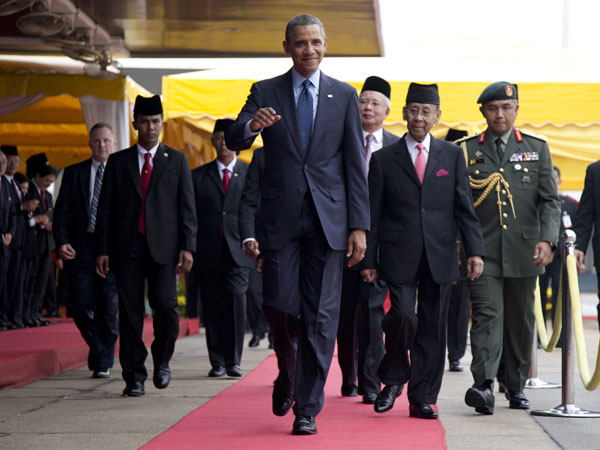In Malaysia, Obama keeps focus on human rights

President Barack Obama, center, walks with Malaysian King Sultan Abdul Halim Mu’adzam Shah, second from right, and Malaysian Prime Minister Najib Razak, third from right, as he participates in an arrival ceremony in Parliament Square in Kuala Lumpur, Malaysia, Saturday, April 26, 2014. AP
KUALA LUMPUR, Malaysia — President Barack Obama on Sunday pressed the Malaysian government to improve its human rights record and appealed to Southeast Asia’s teeming youth population to stand up for the rights of minorities and the rule of law.
Yet Obama skipped a golden chance to promote that human rights agenda, declining to meet with opposition leader Anwar Ibrahim. Instead, he directed national security adviser Susan Rice to see Anwar on Monday.
Obama said his decision was “not indicative of our lack of concern” about the former deputy prime minister who recently was convicted for the second time on sodomy charges, which the U.S. and international human rights groups contend are politically motivated.
Obama said he had raised his concerns about Malaysia’s restrictions on political freedoms during meetings with Prime Minister Najib Razak.
“Those values are at the core of who the U.S. is, but also I think are a pretty good gauge of whether a society is going to be successful in the 21st century or not,” Obama said during a news conference with Najib.
Obama called the prime minister a “reformer” committed to addressing human rights issues.
To his critics, Najib said, “Don’t underestimate or diminish whatever we have done.”
Obama wrapped up his stay in Malaysia, the third stop on a four-country swing through Asia, with a business-related event Monday morning. Executives from three American companies — General Electric Co., Verdezyne Inc. and MetLife Inc. — signed agreements with Malaysian companies as Obama and Najib looked on. Obama said the deals are worth nearly $2 billion.
“It means these companies will be doing more business in Malaysia and selling more exports marked ‘Made in America,'” he said. “These deals support American jobs in places like Ohio and North Carolina, and companies that export often pay better wages, so it’s a good day for American workers as well.”
Obama said more needs to be done to promote trade, such as finalizing the Trans-Pacific Partnership free-trade agreement among the U.S., Malaysia and 10 other countries.
The president then left for the Philippines, where he was expected to announce a 10-year security agreement that would allow for a larger U.S. military presence there amid the Philippines’ increasingly tense territorial disputes with China.
Obama’s visit to Malaysia, the first by a U.S. president in nearly 50 years, elevated human rights to the forefront of his agenda.
While Malaysia has undertaken some reforms, the organization Human Rights Watch says religious and ethnic minorities face persecution and the government uses “highly restrictive laws and abusive implementation” to crack down on political opponents.
Part of Obama’s strategy for confronting these issues has been through direct appeals to young people. It’s an approach that his advisers say could be particularly effective in Southeast Asian nations such as Malaysia that have young populations.
“Young people will ultimately determine the future of this region given that there’s such a big youth bulge,” said Ben Rhodes, Obama’s deputy national security adviser.
Following his talks with Najib, Obama met with students participating in a new technology program and then held a town hall with 400 young leaders from throughout Southeast Asia. The event was part of a U.S. initiative to help mentor emerging business, government and civil society leaders, mirroring a program the White House launched in Africa during Obama’s first term.
After days of meeting with government officials and attending state dinners, the president appeared to relish in his question-and-answer session.
He described at length his work as a community organizer in Chicago, his relationship with his daughters, and his biggest regret, which he said was not spending enough time with his mother, who died of cancer.
The president made calls for respecting diversity, saying “nations are stronger and more successful when they work to uphold the civil rights and political rights and human rights of all their citizens.” The audience responded with applause.
In another nod to efforts to press for human rights reforms, Obama met in the evening with civil society leaders. But the gathering was closed to reporters and the White House did not release a list of those who attended.
Malaysia has changed significantly in the nearly five decades since Lyndon B. Johnson made the last visit by an American president. Malaysia’s economy is booming, driven largely by its robust energy sector.














